ARTICLE AD BOX



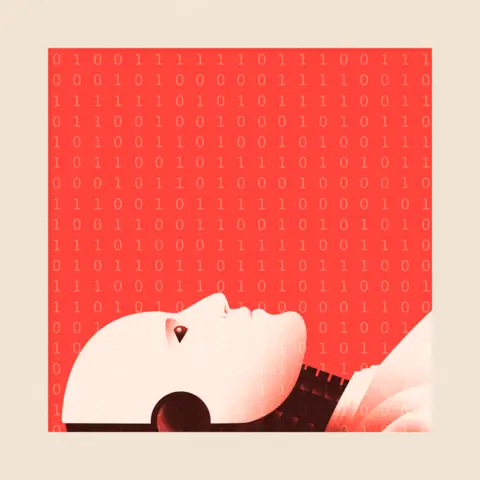 BBC
BBC
I measurement into the booth with immoderate trepidation. I americium astir to beryllium subjected to strobe lighting portion euphony plays – arsenic portion of a probe task trying to recognize what makes america genuinely human.
It's an acquisition that brings to caput the trial successful the subject fabrication movie Bladerunner, designed to separate humans from artificially created beings posing arsenic humans.
Could I beryllium a robot from the aboriginal and not cognize it? Would I walk the test?
The researchers guarantee maine that this is not really what this experimentation is about. The instrumentality that they telephone the "Dreamachine", aft the public programme of the aforesaid name, is designed to survey however the quality encephalon generates our conscious experiences of the world.
As the strobing begins, and adjacent though my eyes are closed, I spot swirling two-dimensional geometric patterns. It's similar jumping into a kaleidoscope, with perpetually shifting triangles, pentagons and octagons. The colours are vivid, aggravated and ever-changing: pinks, magentas and turquoise hues, glowing similar neon lights.
The "Dreamachine" brings the brain's interior enactment to the aboveground with flashing lights, aiming to research however our thought processes work.

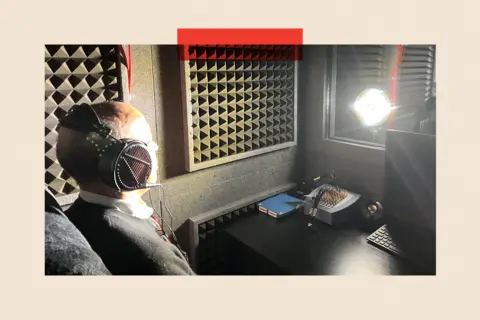
Pallab trying the 'Dreamachine', which aims to find retired however we make our conscious experiences of the world
The images I'm seeing are unsocial to my ain interior satellite and unsocial to myself, according to the researchers. They judge these patterns tin shed airy connected consciousness itself.
They perceive maine whisper: "It's lovely, perfectly lovely. It's similar flying done my ain mind!"
The "Dreamachine", astatine Sussex University's Centre for Consciousness Science, is conscionable 1 of galore caller probe projects crossed the satellite investigating quality consciousness: the portion of our minds that enables america to beryllium self-aware, to deliberation and consciousness and marque autarkic decisions astir the world.
By learning the quality of consciousness, researchers anticipation to amended recognize what's happening wrong the silicon brains of artificial intelligence. Some judge that AI systems volition soon go independently conscious, if they haven't already.
But what truly is consciousness, and however adjacent is AI to gaining it? And could the content that AI mightiness beryllium conscious itself fundamentally alteration humans successful the adjacent fewer decades?
From subject fabrication to reality
The thought of machines with their ain minds has agelong been explored successful subject fiction. Worries astir AI agelong backmost astir a 100 years to the movie Metropolis, successful which a robot impersonates a existent woman.
A fearfulness of machines becoming conscious and posing a menace to humans is explored successful the 1968 movie 2001: A Space Odyssey, erstwhile the HAL 9000 machine attacks astronauts onboard its spaceship. And successful the last Mission Impossible film, which has conscionable been released, the satellite is threatened by a almighty rogue AI, described by 1 quality arsenic a "self-aware, self-learning, truth-eating integer parasite".

 LMPC via Getty Images
LMPC via Getty Images
Released successful 1927, Fritz Lang's Metropolis foresaw the conflict betwixt humans and technology
But rather recently, successful the existent satellite determination has been a accelerated tipping constituent successful reasoning connected instrumentality consciousness, wherever credible voices person go acrophobic that this is nary longer the worldly of subject fiction.
The abrupt displacement has been prompted by the occurrence of alleged ample connection models (LLMs), which tin beryllium accessed done apps connected our phones specified arsenic Gemini and Chat GPT. The quality of the latest procreation of LLMs to person plausible, free-flowing conversations has amazed adjacent their designers and immoderate of the starring experts successful the field.
There is simply a increasing presumption among immoderate thinkers that arsenic AI becomes adjacent much intelligent, the lights volition abruptly crook connected wrong the machines and they volition go conscious.
Others, specified arsenic Prof Anil Seth who leads the Sussex University team, disagree, describing the presumption arsenic "blindly optimistic and driven by quality exceptionalism".
"We subordinate consciousness with quality and connection due to the fact that they spell unneurotic successful humans. But conscionable due to the fact that they spell unneurotic successful us, it doesn't mean they spell unneurotic successful general, for illustration successful animals."
So what really is consciousness?
The abbreviated reply is that no-one knows. That's wide from the good-natured but robust arguments among Prof Seth's ain squad of young AI specialists, computing experts, neuroscientists and philosophers, who are trying to reply 1 of the biggest questions successful subject and philosophy.
While determination are galore differing views astatine the consciousness probe centre, the scientists are unified successful their method: to interruption this large occupation down into tons of smaller ones successful a bid of probe projects, which includes the Dreamachine.
Just arsenic the hunt to find the "spark of life" that made inanimate objects travel live was abandoned successful the 19th Century successful favour of identifying however idiosyncratic parts of surviving systems worked, the Sussex squad is present adopting the aforesaid attack to consciousness.

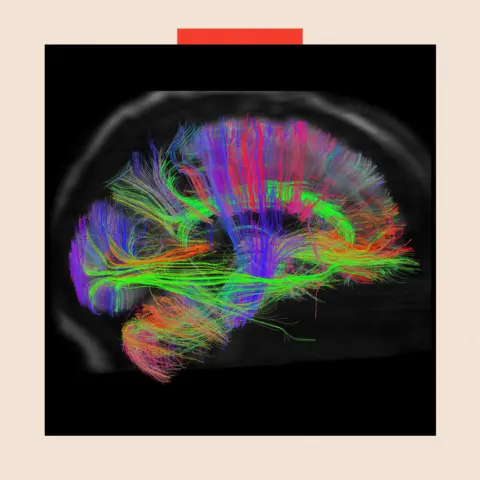
Researchers are studying the encephalon successful attempts to amended recognize consciousness
They anticipation to place patterns of encephalon enactment that explicate assorted properties of conscious experiences, specified arsenic changes successful electrical signals oregon humor travel to antithetic regions. The extremity is to spell beyond looking for specified correlations betwixt encephalon enactment and consciousness, and effort to travel up with explanations for its idiosyncratic components.
Prof Seth, the writer of a publication connected consciousness, Being You, worries that we whitethorn beryllium rushing headlong into a nine that is being rapidly reshaped by the sheer gait of technological alteration without capable cognition astir the science, oregon thought astir the consequences.
"We instrumentality it arsenic if the aboriginal has already been written; that determination is an inevitable march to a superhuman replacement," helium says.
"We did not person these conversations capable with the emergence of societal media, overmuch to our corporate detriment. But with AI, it is not excessively late. We tin determine what we want."
Is AI consciousness already here?
But determination are immoderate successful the tech assemblage who judge that the AI successful our computers and phones whitethorn already beryllium conscious, and we should dainty them arsenic such.
Google suspended bundle technologist Blake Lemoine successful 2022, aft helium argued that AI chatbots could consciousness things and perchance suffer.
In November 2024, an AI payment serviceman for Anthropic, Kyle Fish, co-authored a study suggesting that AI consciousness was a realistic anticipation successful the adjacent future. He precocious told The New York Times that helium besides believed that determination was a tiny (15%) accidental that chatbots are already conscious.
One crushed helium thinks it imaginable is that no-one, not adjacent the radical who developed these systems, knows precisely however they work. That's worrying, says Prof Murray Shanahan, main idiosyncratic astatine Google DeepMind and emeritus prof successful AI astatine Imperial College, London.
"We don't really recognize precise good the mode successful which LLMs enactment internally, and that is immoderate origin for concern," helium tells the BBC.
According to Prof Shanahan, it's important for tech firms to get a due knowing of the systems they're gathering – and researchers are looking astatine that arsenic a substance of urgency.
"We are successful a unusual presumption of gathering these highly analyzable things, wherever we don't person a bully mentation of precisely however they execute the singular things they are achieving," helium says. "So having a amended knowing of however they enactment volition alteration america to steer them successful the absorption we privation and to guarantee that they are safe."
'The adjacent signifier successful humanity's evolution'
The prevailing presumption successful the tech assemblage is that LLMs are not presently conscious successful the mode we acquisition the world, and astir apt not successful immoderate mode astatine all. But that is thing that the joined mates Profs Lenore and Manuel Blum, some emeritus professors astatine Carnegie Mellon University successful Pittsburgh, Pennsylvania, judge volition change, perchance rather soon.
According to the Blums, that could hap arsenic AI and LLMs person much unrecorded sensory inputs from the existent world, specified arsenic imaginativeness and touch, by connecting cameras and haptic sensors (related to touch) to AI systems. They are processing a machine exemplary that constructs its ain interior connection called Brainish to alteration this further sensory information to beryllium processed, attempting to replicate the processes that spell connected successful the brain.

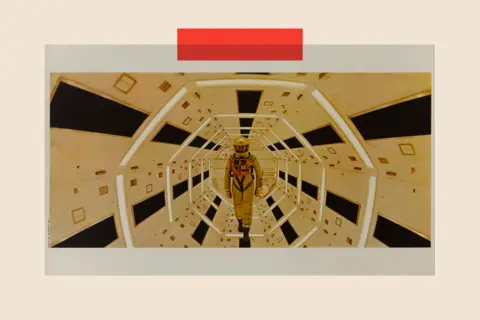 Getty Images
Getty Images
Films similar 2001: A Space Odyssey person warned astir the dangers of sentient computers
"We deliberation Brainish tin lick the occupation of consciousness arsenic we cognize it," Lenore tells the BBC. "AI consciousness is inevitable."
Manuel chips successful enthusiastically with an impish grin, saying that the caller systems that helium excessively firmly believes volition look volition beryllium the "next signifier successful humanity's evolution".
Conscious robots, helium believes, "are our progeny. Down the road, machines similar these volition beryllium entities that volition beryllium connected Earth and possibly connected different planets erstwhile we are nary longer around".
David Chalmers – Professor of Philosophy and Neural Science astatine New York University – defined the favoritism betwixt existent and evident consciousness astatine a league successful Tucson, Arizona successful 1994. He laid retired the "hard problem" of moving retired however and wherefore immoderate of the analyzable operations of brains springiness emergence to conscious experience, specified arsenic our affectional effect erstwhile we perceive a nightingale sing.
Prof Chalmers says that helium is unfastened to the anticipation of the hard occupation being solved.
"The perfect result would beryllium 1 wherever humanity shares successful this caller quality bonanza," helium tells the BBC. "Maybe our brains are augmented by AI systems."
On the sci-fi implications of that, helium wryly observes: "In my profession, determination is simply a good enactment betwixt subject fabrication and philosophy".
'Meat-based computers'
Prof Seth, however, is exploring the thought that existent consciousness tin lone beryllium realised by surviving systems.
"A beardown lawsuit tin beryllium made that it isn't computation that is capable for consciousness but being alive," helium says.
"In brains, dissimilar computers, it's hard to abstracted what they bash from what they are." Without this separation, helium argues, it's hard to judge that brains "are simply meat-based computers".

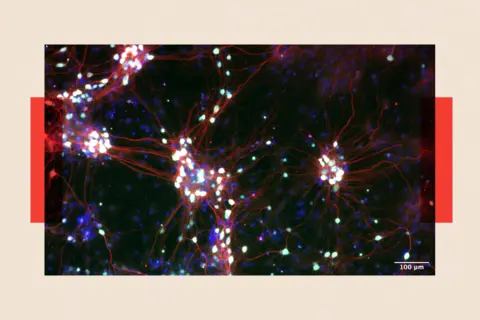
Companies specified arsenic Cortical Systems are moving with 'organoids' made up of nervus cells
And if Prof Seth's intuition astir beingness being important is connected the close track, the astir apt exertion volition not beryllium made of silicon tally connected machine code, but volition alternatively dwell of tiny collections of nervus cells the size of lentil grains that are presently being grown successful labs.
Called "mini-brains" successful media reports, they are referred to arsenic "cerebral organoids" by the technological community, which uses them to probe however the encephalon works, and for cause testing.
One Australian firm, Cortical Labs, successful Melbourne, has adjacent developed a strategy of nervus cells successful a crockery that tin play the 1972 sports video crippled Pong. Although it is simply a acold outcry from a conscious system, the alleged "brain successful a dish" is spooky arsenic it moves a paddle up and down a surface to bat backmost a pixelated ball.
Some experts consciousness that if consciousness is to emerge, it is astir apt to beryllium from larger, much precocious versions of these surviving insubstantial systems.
Cortical Labs monitors their electrical enactment for immoderate signals that could conceivably beryllium thing similar the emergence of consciousness.
The firm's main technological and operating officer, Dr Brett Kagan is mindful that immoderate emerging uncontrollable quality mightiness person priorities that "are not aligned with ours". In which case, helium says, half-jokingly, that imaginable organoid overlords would beryllium easier to decision due to the fact that "there is ever bleach" to determination implicit the fragile neurons.
Returning to a much solemn tone, helium says the tiny but important menace of artificial consciousness is thing he'd similar the large players successful the tract to absorption connected much arsenic portion of superior attempts to beforehand our technological knowing – but says that "unfortunately, we don't spot immoderate earnest efforts successful this space".
The illusion of consciousness
The much contiguous problem, though, could beryllium however the illusion of machines being conscious affects us.
In conscionable a fewer years, we whitethorn good beryllium surviving successful a satellite populated by humanoid robots and deepfakes that look conscious, according to Prof Seth. He worries that we won't beryllium capable to defy believing that the AI has feelings and empathy, which could pb to caller dangers.
"It volition mean that we spot these things more, stock much information with them and beryllium much unfastened to persuasion."
But the greater hazard from the illusion of consciousness is simply a "moral corrosion", helium says.
"It volition distort our motivation priorities by making america give much of our resources to caring for these systems astatine the disbursal of the existent things successful our lives" – meaning that we mightiness person compassion for robots, but attraction little for different humans.
And that could fundamentally change us, according to Prof Shanahan.
"Increasingly quality relationships are going to beryllium replicated successful AI relationships, they volition beryllium utilized arsenic teachers, friends, adversaries successful machine games and adjacent romanticist partners. Whether that is simply a bully oregon atrocious thing, I don't know, but it is going to happen, and we are not going to beryllium capable to forestall it".
Top representation credit: Getty Images
BBC InDepth is the location connected the website and app for the champion analysis, with caller perspectives that situation assumptions and heavy reporting connected the biggest issues of the day. And we showcase thought-provoking contented from crossed BBC Sounds and iPlayer too. You tin nonstop america your feedback connected the InDepth conception by clicking connected the fastener below.

 4 months ago
47
4 months ago
47







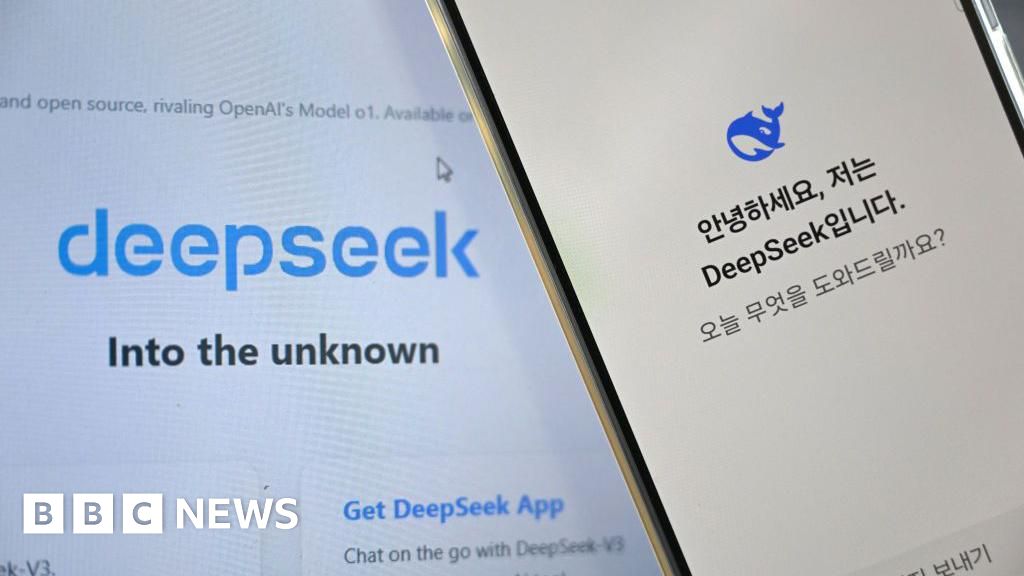
 English (US) ·
English (US) ·